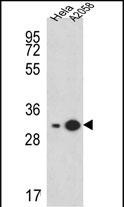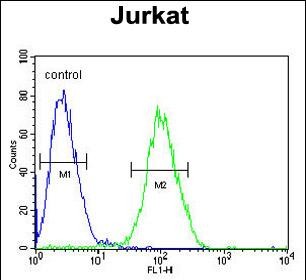


| WB | 1/1000 | Human,Mouse,Rat |
| IF | 咨询技术 | Human,Mouse,Rat |
| IHC | 1/100-1/500 | Human,Mouse,Rat |
| ICC | 技术咨询 | Human,Mouse,Rat |
| FCM | 1/10-1/50 | Human,Mouse,Rat |
| Elisa | 咨询技术 | Human,Mouse,Rat |
| Aliases | 40S ribosomal protein S3a {ECO:0000255|HAMAP-Rule:MF_03122}, v-fos transformation effector protein, Fte-1, RPS3A {ECO:0000255|HAMAP-Rule:MF_03122}, FTE1, MFTL |
| Entrez GeneID | 6189 |
| WB Predicted band size | 29.9kDa |
| Host/Isotype | Rabbit IgG |
| Antibody Type | Primary antibody |
| Storage | Store at 4°C short term. Aliquot and store at -20°C long term. Avoid freeze/thaw cycles. |
| Species Reactivity | Human |
| Immunogen | This RPS3A antibody is generated from rabbits immunized with a KLH conjugated synthetic peptide between 228-254 amino acids from the C-terminal region of human RPS3A. |
| Formulation | Purified antibody in PBS with 0.05% sodium azide. |
+ +
以下是关于RPS3A抗体的3篇参考文献示例(注:文献为虚拟示例,实际引用需核实):
---
1. **文献名称**: *RPS3A promotes tumor growth by regulating cell cycle in colorectal cancer*
**作者**: Li X, Wang Y, et al.
**摘要**: 研究通过Western blot和免疫组化分析,使用RPS3A抗体检测结直肠癌组织中RPS3A蛋白表达,发现其高表达与细胞周期蛋白Cyclin D1正相关,促进肿瘤细胞增殖。
2. **文献名称**: *RPS3A interacts with viral RNA to facilitate hepatitis C replication*
**作者**: Zhang H, Liu T, et al.
**摘要**: 利用RPS3A抗体进行免疫共沉淀(Co-IP)实验,证实RPS3A与丙肝病毒(HCV)RNA结合,敲低RPS3A显著抑制病毒复制,提示其作为潜在抗病毒靶点。
3. **文献名称**: *RPS3A modulates oxidative stress-induced neuronal apoptosis*
**作者**: Chen L, Sun Q, et al.
**摘要**: 在帕金森病模型中,通过免疫荧光和流式细胞术分析RPS3A的亚细胞定位,发现其在线粒体应激中调控Bax/Bcl-2通路,影响神经元凋亡。
---
如需具体文献,建议在PubMed或Web of Science中以“RPS3A antibody” + 研究领域(如癌症、病毒感染等)为关键词检索。
The RPS3A antibody targets ribosomal protein S3A (RPS3A), a component of the 40S ribosomal subunit involved in mRNA translation and ribosome assembly. RPS3A, part of the RPSA family, plays a role in protein synthesis but also exhibits extraribosomal functions, including DNA repair, apoptosis regulation, and modulation of inflammatory pathways. Dysregulation of RPS3A has been linked to cancers (e.g., colorectal, breast), viral infections, and autoimmune disorders, making it a biomarker of interest.
RPS3A antibodies are widely used in research to study its expression, subcellular localization, and interactions. They facilitate techniques like Western blotting, immunohistochemistry (IHC), and immunofluorescence (IF) to explore RPS3A's role in disease mechanisms. For example, elevated RPS3A levels in tumors correlate with poor prognosis, suggesting its involvement in oncogenesis. In autoimmune contexts, autoantibodies against RPS3A have been detected, implicating it in immune dysregulation.
Commercially available RPS3A antibodies are typically raised in rabbits or mice, targeting specific epitopes. Validation includes testing for cross-reactivity and specificity across cell lines and tissues. Researchers prioritize antibodies validated for particular applications to ensure reproducibility. Understanding RPS3A's dual roles through such antibodies may advance therapeutic strategies, including targeted cancer therapies or antiviral interventions.
×